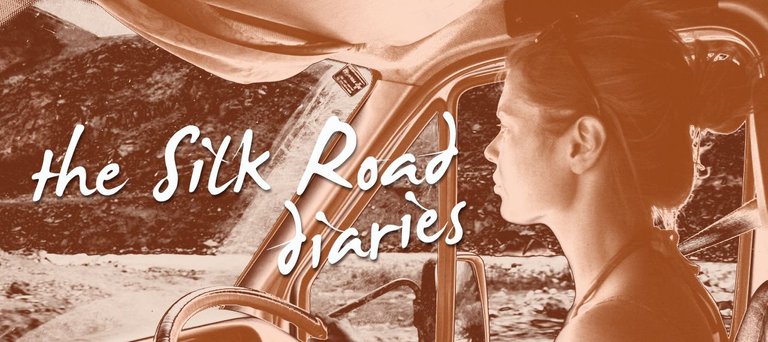
Welcome to the Silk Road diaries... the place where I am finally recording my stories and reflections from an overland trip from the UK to Mongolia back in 2011. It's taken me a long time to process how truly life-changing this journey was, but finally my adventures feel ripe and ready to share. Follow this link for an intro to this series, including more about my vehicle and the charity project I was a part of - the Mongol Rally. Or, click here to read Part I of the Pamir Highway.
Overall our journey was around 13,000 miles long. We wanted to make the most of the opportunity to explore remote and exotic places, so we chose a (perhaps unnecessarily!) zig-zagging route South through Europe and through Central Asia. Personally, I'm a desert loving soul. So this route was kind of a dream for me. A sandy, sun-cracked, baking hot dream.
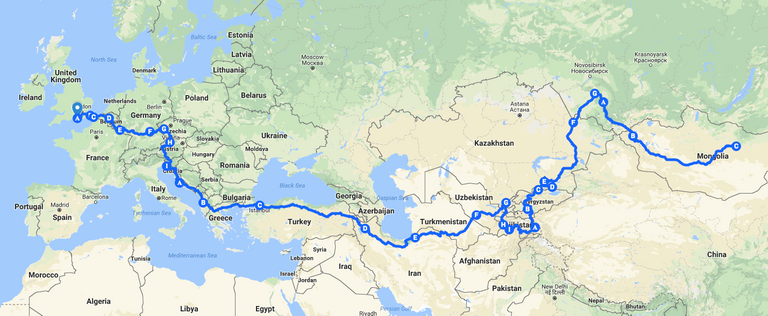
I'm working on a more pro map, but for now this gives you an idea of our overall route!
The Pamir Highway: Part II

The route of the Pamir Highway through Tajikistan - the yellow square is the region covered in this post
In my last post I left you in a leafy truck stop where we'd escaped the stress of a potentially lethal road. We stayed the night, revelling in the newly-discovered luxury of explosives-free-movement, and awoke full of gratitude - and some trepidation - to another crystal clear blue sky.
The combination of desert and altitude in Tajikistan creates beautiful clean air and, somehow, a real sense of spaciousness. If I close my eyes I can still feel the expansiveness of waking up, feeling the cool air on my face, and knowing there's nothing to do today except keep going. I grew up in an extremely flat part of the UK, and so I have a deep fascination with mountains and the views they enable - Tajikistan was moment after moment of jaw-dropping heights and raw elemental experiences.
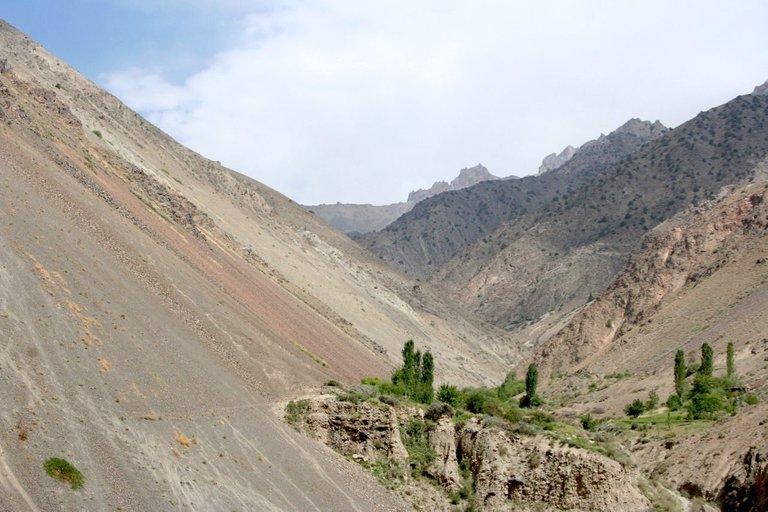
We continued along the road to Khorog, partially paved / partially broken / partially dust and rock-strewn, our only focus being "keep moving forwards". With the land-mines scattering the road-edges there was no easy way to turn around, even if we had wanted to; so forward it was, or "onward and upward" as my mother would say.
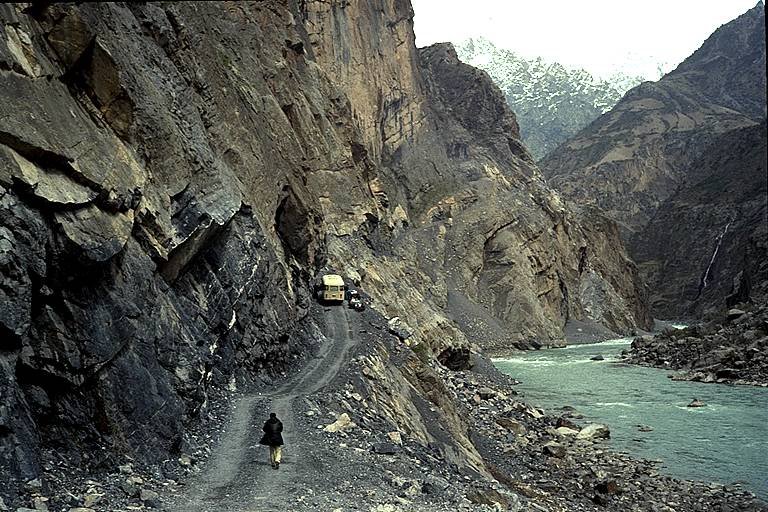
Image source Note the tunnel roughly hewn out of the rock face - this will become relevant shortly
Khorog
Eventually we made it to Khorog - another strangely leafy oasis in the otherwise arid landscape, bizarrely full of Poplar trees which, in my opinion, gave it a Tuscan feel. Compared to where we had come from Khorog felt like a bustling metropolis, and we were glad to find a homestay / bunkhouse type affair where we could pay a tiny amount to sleep on a wooden platform (alongside a bunch of other waifs and strays) and use a shower.
Now when I left the UK, I was a bit squeamish about sleeping near strangers; I am a light sleeper, and other people snoring is essentially my idea of hell. But after weeks of sleeping in what was fast becoming a dustbowl*, sleeping on cleanly swept planks of wood - strangers or no strangers - was kind of dreamy.
*When you drive old vehicles on nicely paved roads, it never occurs to you that the vehicle might not be a sealed unit. When you drive old vehicles on rocky dirt roads and through sand dunes, however, you realise that there are an infinite number of tiny cracks and broken seals through which the dust streams in joyous abundance. We tried covering every seal with gaffer tape - pointless. Try driving an hour on a dirt road and keeping anything remotely clean - I will be impressed. Add to this the effect of waking up in a pool of sweat because you're in a desert in a metal and fibreglass box, and you've got a wonderfully grubby, sticky mess on your hands. Do this for days and days without access to a shower (and in countries where it's really not cool to strip off for a bucket-wash), and it's seriously f%cking gross. Suffice to say, that shower in Khorog was worth every penny.
We re-fuelled here - both literally and emotionally - before setting off once more into the dusty unknown.
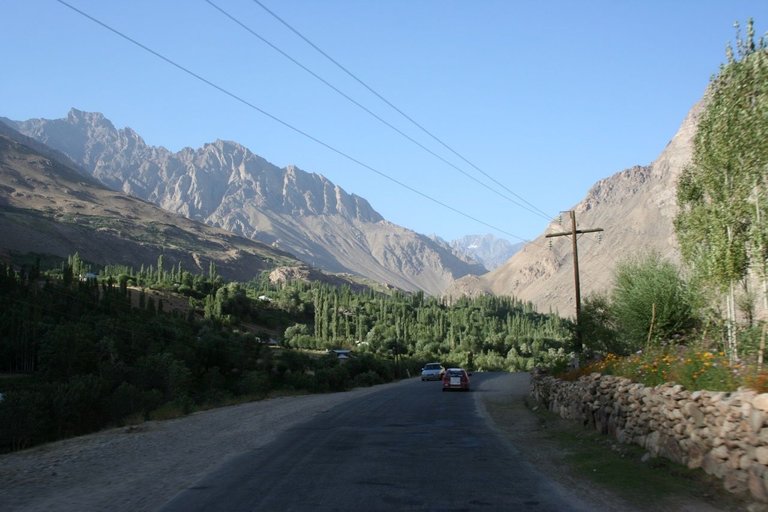
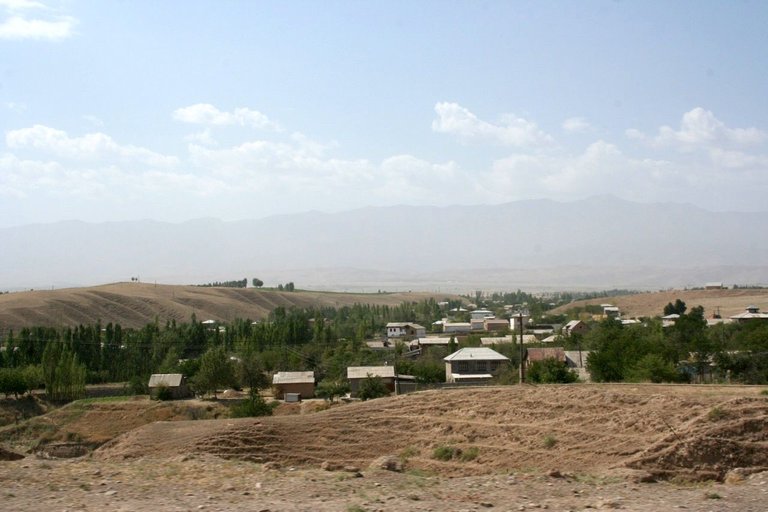
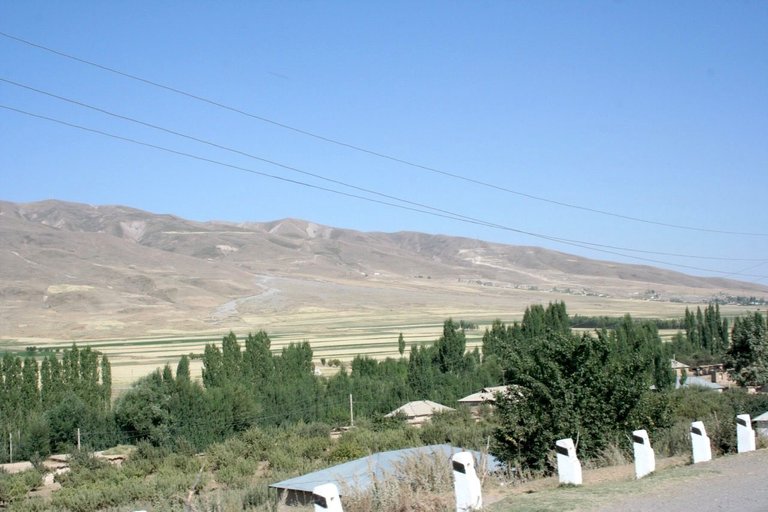
Khorog to Murghab
Out of Khorog the road continued to climb. We crossed (thankfully) dry riverbeds and navigated fairly terrifying pitch-black tunnels that had been chipped out of the mountains. It turns out there's a lot of engineering involved in building tunnels (who knew!) to prevent them from filling with water. Sadly, none of this expertise had been used in Tajikistan at the time. Our next hair-raising moment was probably the one time in my life where I've experienced full-body I'm-about-to-die type fear. [No, apparently that didn't really happen with the land-mines - I'm either naïve or stupid!].
Imagine you are going into a tunnel. You can't see the end of it, and as you enter you realise the ground of the tunnel is covered in water. A truck in front of you is weaving erratically across the road; the water covering the floor makes it difficult to see what's going on, but after a moment you realise the driver is avoiding hidden potholes. You speed up, trying to follow their back-and-forth route through the tunnel.
I tried hard to keep up, but the truck driver knew this road well and his vehicle was smaller and nippier than ours. He gained some distance, and I was forced to slow as one of our wheels caught the edge of a pothole: he was gone.
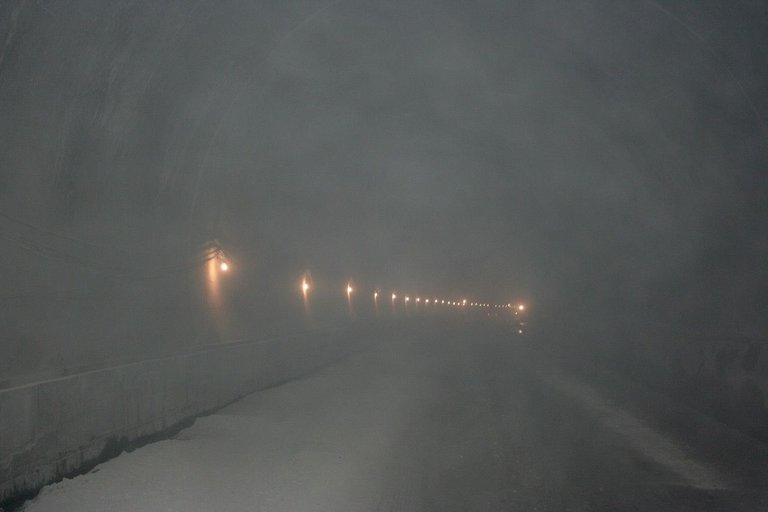
This is not the tunnel under discussion - this tunnel has lights and a visible floor. But it gives you an idea of what tunnels are like when they're less engineered - especially the mix of dust and moisture in the air
We were about a kilometre into the tunnel and had no way of knowing where the holes were. It was pitch black. To make matters worse, the air was now thick with misty condensation. I ploughed on stubbornly, trying to engage some sort of sixth sense as I weaved and dodged the hidden holes in the road. My confidence was just starting to grow when one of the back wheels clipped a deep hole. A hole so deep, in fact, that the back of the ambulance slid back and down into it. The engine stalled and I couldn't start It again. After a moment we realised why: the ambulance was balanced on the edge of the hole, so that only two wheels were touching the ground.
We were alone in the dark. The air was thick, and visibility was extremely poor. We were perched precariously on the edge of a hole, with no idea how deep it was. We couldn't start the engine. And at any moment another truck might speed into us, unable to see us in the dark damp depths.
At this point it's fair to say I completely freaked out. For that brief moment it felt like we were utterly stuck, and almost certainly in danger of causing a crash in a place where it could take any sort of rescue services days to reach us. [And even then, we were days away from the nearest hospital]. Not to mention getting stuck in a remote part of Tajikistan with a wrecked vehicle.
Ever the cool-headed practical co-driver, my partner took the wheel and - thinking on his feet - told me to run from the front to the back of the van while he tried to start the engine. We needed to get more wheels on the ground to create enough torque. After a few minutes of turning the ambulance into a massive see-saw it finally worked! The engine started, and we managed to get the back wheels into contact with the earth. The ambulance juddered and wrenched from side to side as it found some grip, and with a surge of speed we were out of the hole.
My body was pumped with adrenaline and I was shaking. This whole experience had probably only lasted about 10 minutes, but it felt like hours. I sat in the passenger seat for a long while afterwards - and a good job too, it turned out this particular tunnel was many kilometres long!
On we drove. The next town on the map was Murghab, the last settlement before the road reached its 4655m peak at the Ak-Baital Pass.
Murghab
I remember reading a lot into the relative size of the text on our maps. 'Murghab' was written in a bold font the same size as 'Khorog', so I was looking forward to touching base with civilisation again (or at least another shower). As we approached Murghab however, it was clear that these places were very different. The route towards Murghab brought us up and out of the deep river valley, onto high plains bleached by the sun. Gone was the river, gone were the Poplars - the road suddenly felt deserted except for the occasional leathery-looking goat herder.
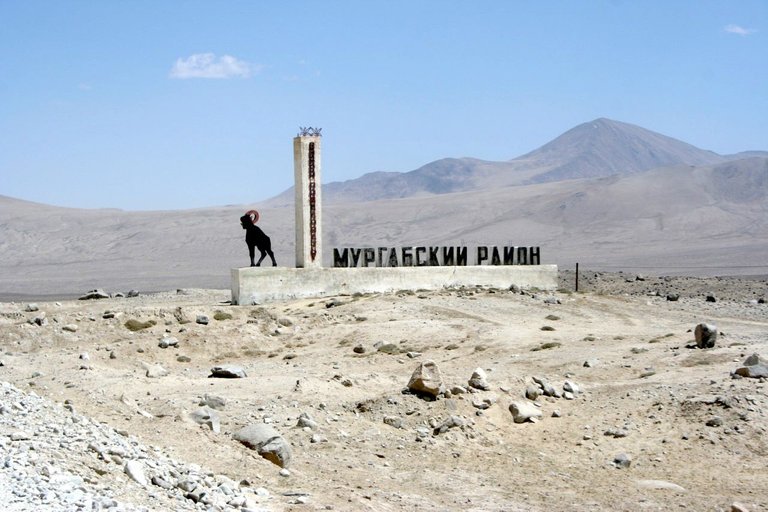
As we drove in, the town itself also felt deserted. Low-slung buildings clustered either side of broad, unpaved sandy streets; we'd assumed we would stop a passer-by and ask for guidance, but there was nobody to be found. Eventually we used one of our many maps to work out which building might house the so-called 'internet café' (we'd been trying to tweet updates to our family fairly regularly to let them know we were safe). I pushed the heavy door open and blinked into the dark. As my eyes adjusted I noticed a small, weathered man stooped over a table; there was a single aged computer, covered in a film of dust, in the corner.
"Internet?" I asked, readying myself for the usual array of experimental gestures I'd been developing in these situations.
The man blinked at me, nodded, and held his hand out for some money. I gave him some coins and he disappeared out of the door.
A month ago this would have confused or annoyed me. Had this guy just walked off with my coins? Wasn't he going to explain what happens next? But by now we had been through enough border controls and had enough bizarre exchanges to have learnt: roll with it. A clunking noise sounded outside, and we heard a generator reluctantly growl into life:
he had to use the coins to buy diesel, to turn on the generator, to power the computer. We looked at each other - something told us we wouldn't be tweeting anything today.
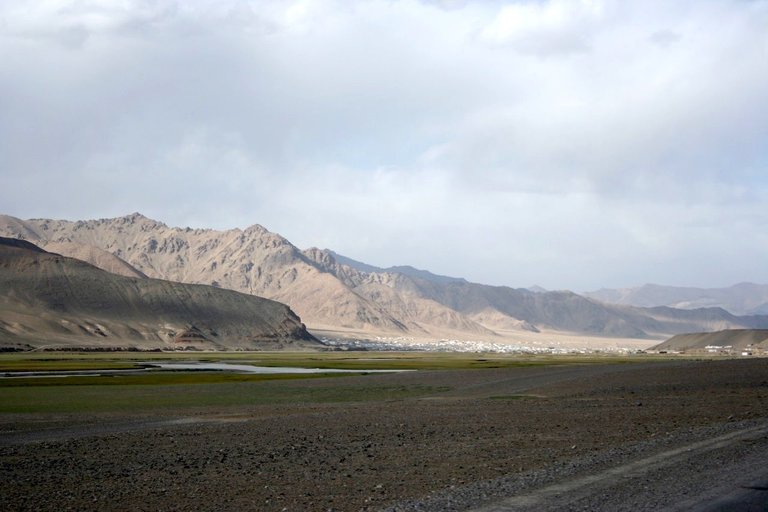
Our next mission was to buy a new tyre - we'd managed to puncture ours on a nail in no-mans-land at the Uzbek-Tajik border. We needed a mechanic. The old man in the internet café didn't understand what we were after, but after some hanging around scratching our chins in the street we seemed to catch the attention of a bunch of kids. I felt for them - what must it be like being a teenager in a place this remote? No wonder they did a b-line for the weird foreigners in town.
After much gesticulating the kids seemed to know what we needed, but their directions were complicated. After the fourth or fifth attempt at drawing a map in the sand, one of them grabbed their biked and motioned to us - follow me!
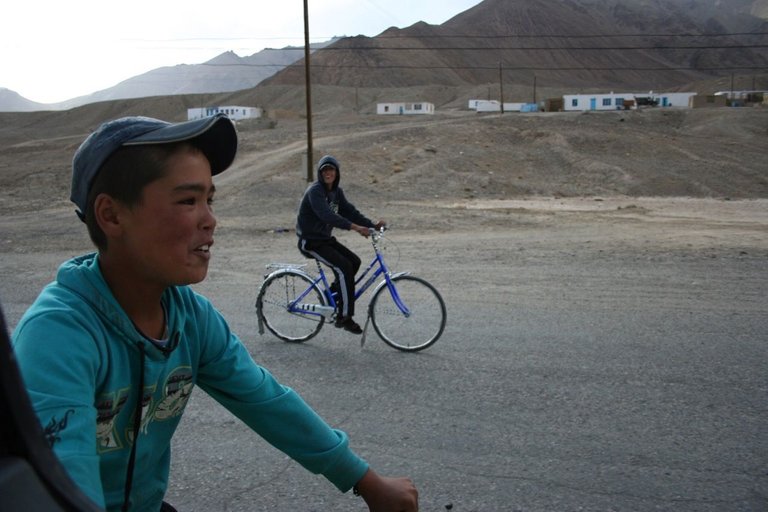

The kids took us out of town, into what felt like it might be a sort of 'industrial zone', although in reality it was a selection of rusting shacks. Sure enough we found a mechanic*, and after wrestling the flat tyre out from it's cage under the vehicle things progressed quickly. In a frankly impressive show of strength the mechanic wrenched our tyre from the wheel, and fitted another in hardly any time at all.
*In countries like Tajikistan, 'mechanic' becomes a general term for 'man-with-selection-of-metal-bits-who-can-force-said-metal-bits-into-desired-shape'. In these remote, poorly connected places, there is no such thing as a 'genuine part', unless you're looking to fix your lovely soviet-era Russian minibus. On our journey we witnessed some amazing mechanical efforts (did you know Coca-Cola can be used to free up stuck head gaskets?), along with some distinctly less amazing ones (no, coat-hangers are not adequate to fix a suspension fork - thankfully not ours).
Meanwhile, I had found some gorgeous kids to hang out with, having been abandoned by the teenagers.
We found a place to stay, readying ourselves for the next extreme part of our journey along the Pamir Highway: the Ak-Baital Pass. Here the road climbs to an intimidating 4600m. We had no idea how our vehicle would behave at that altitude, having heard tales of lack of air in the engine and all sorts of other bothersome quirks.
Find out what happened in the next instalment!
Unless otherwise stated, all photos in this post were taken with a Canon EOS 350D or a Canon Sureshot 115u 35mm.
Thanks for reading!
I'm Alice: lover of nature, photography, art, singing and spirituality. In 2011 I drove from the UK to Mongolia, and I've chosen Steemit as the platform to share my stories.
Follow me for more Silk Road diaries!
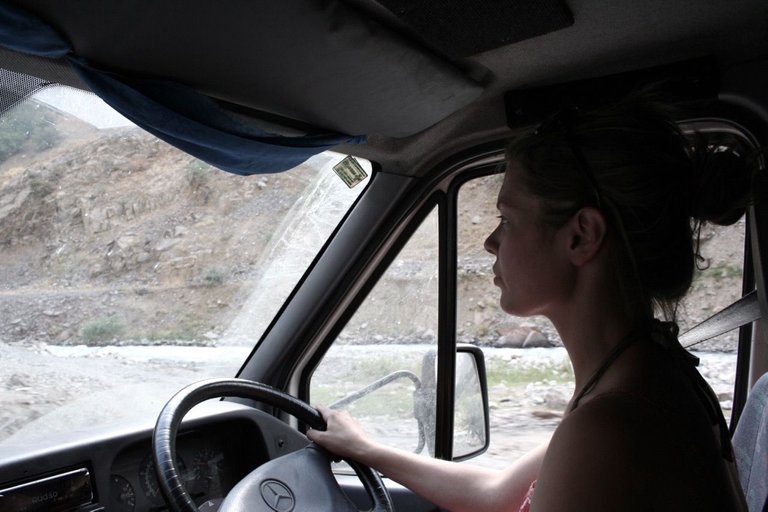

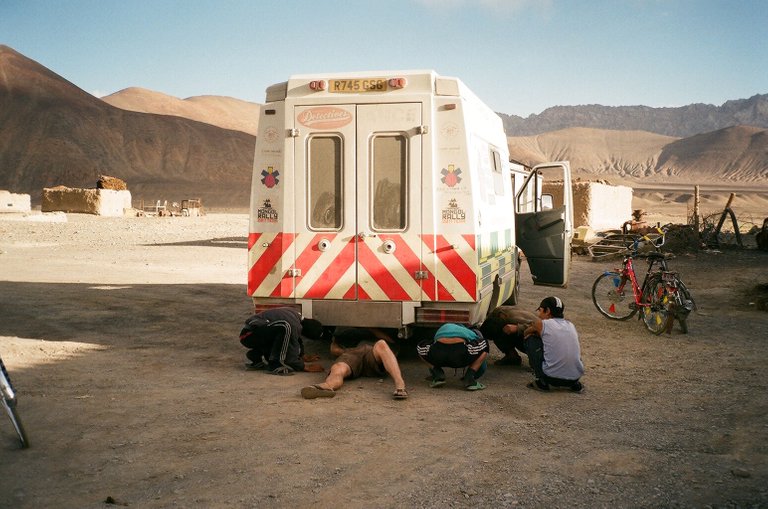
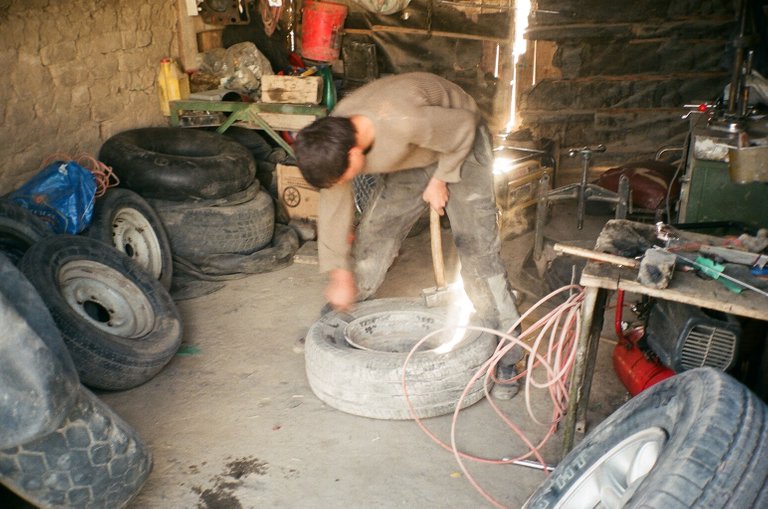
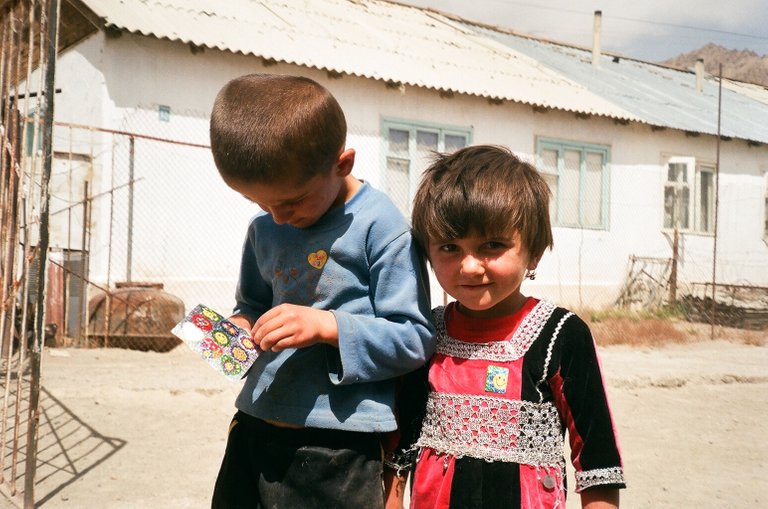

Please send manicurist with false nails over to my house. I have chewed all of mine down to their cuticles!!! I hold you and your scintillating story telling fully responsible!
I know I asked for the map, but now it's up I have to declare you double nuts. It's starting to fully sink in what a mind-blowing trip you went on. Zig-zag? Why not!?! You might find another pothole to liven things up a bit.
Half way through I almost got up to take a shower, the way you described that sticky gungy dust!
So heartwarming to read about all the helpful hands you got to meet.
I can hear that generator, and the impossible directions chattered unintelligibly. Your photos and text are amazingly engaging.
Powerful stuff. Even I am becoming vicariously transformed by reading it. I don't know how you managed to return to normal UK life... and this is only part 2....
Haha what an amazing response @sukhasanasister, I can only apologise for the manicure-inducing aspect of my writing ;)
Honestly though, knowing that a few folks are reading and enjoying these posts means so much and is my motivation to keep writing, so THANK YOU!
I have re-steemed this on my main blog. Really hope it gets some good rewards. Another great story
Awesome, thank you so much!
What a crazy journey. I'd love to do this one day. I really enjoyed the story and can't wait til the next one.
My advice would be - go for it! If you engage your brain too much about the costs and logistics etc it can put you off, better to be spontaneous and throw caution to the wind ;)
Thank you so much for the support!
Big thanks to @sukhasanasister for the tip to include more maps! :)
wow what an adventure. I would love to do an overland trip to asia, we have gone to north Africa with our housetruck. really great photos and that tunnel sounded full on. following you now so that I can read some more.
Great! Thanks for following me! I'd love to do more overland trips, north Africa must have been amazing - I loved how we got to engage with a whole different side of society being on the road every day. Do you live in a truck full time?
You are very senior in steem, and I am very junior, I need help from you and I really appreciate it